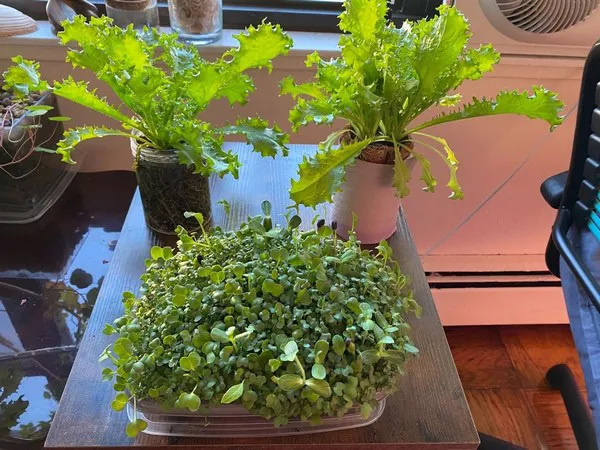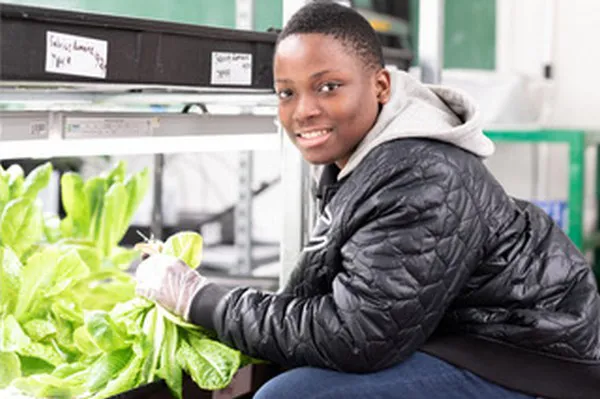Teens for Food Justice (TFFJ), a nonprofit with a mission to ensure that all New Yorkers have access to fresh and healthy food through youth-led, school-based hydroponic farming, is helping kids living in NYC's food deserts continue growing nutritious produce and engaging with food justice content during the pandemic. By imparting cutting-edge urban agriculture techniques through a home-based model, TFFJ has engaged more than 450 middle and high school students in growing fresh produce hydroponically at home and with the ability to share this food, these growing practices, and this important conversation with their families during these challenging times.
Through hydroponic farming, nutrition, and food justice advocacy education emphasizing the importance of a healthy food system for all, TFFJ has helped bring fresh produce to New York City communities that need it most since its creation in 2013. During the pandemic and the challenges presented by school closures, it has helped students to continue to make the connection between growing food and combating food insecurity even when they are not physically able to be on their school-based farms.

Building a sustainable movement
"We not only provide students with advanced solutions to the lack of affordable, fresh food in food desert communities. We also enable them to further connect with the concepts that we teach them through our daily curriculum and after-school programs, only now in a different setting," said Katherine Soll, TFFJ CEO and Founder. Soll added, "We are building the foundation for a sustainable social movement that can help to close the gaps between low- and upper-income urban communities."
Using indoor hydroponic farming systems, TFFJ’s school-based farms have galvanized a youth-led movement to eradicate food insecurity in one generation. This innovative urban agricultural technology enables students ages 12-18 to harvest as much as 10,000 pounds of fresh produce per year at four New York City Title I public schools. Until schools closed due to the pandemic, the produce was served daily in the schools’ cafeterias, providing fresh, nutritious food to all students campus-wide. Thanks to the farms’ large-scale production, this produce was also distributed both free and affordably by students to local community members and donated to local food pantries.
Pandemic
After the pandemic forced school (and TFFJ farm) shutdowns in mid-March 2020, TFFJ redirected its efforts towards partnering with local growers and began distributing 600 pounds of fresh produce weekly to its school partner communities, supplementing the grab-and-go food options primarily available to residents through COVID-19 relief feeding programs. Today, TFFJ operates weekly and bi-weekly food distributions in four school partner communities located in Kingsbridge, the Bronx, Brownsville, Brooklyn, Far Rockaway, Queens, and Lincoln Center/Hell's Kitchen in Manhattan. Altogether, this effort has benefited as many 1,000 New York households per week.
TFFJ has also distributed more than 450 at-home hydroponic growing kits to its curricular day and after-school Food Justice Collective students, enabling them to construct small hydroponic systems that grow microgreens and lettuce in their homes. In this way, students who would otherwise engage with TFFJ’s school-based hydroponic farms can still receive a hands-on learning experience, connect the growing of food to food justice, and share what they learn with their families.
Harvesting your meals
"During these times, we have been successful at capturing the kids' interest in our hands-on growing programs. Some teachers have even experienced kids turning on their cameras for the first time during the online home growing kit lessons," said Matthew Horgan, STEM Programming & School Partnership Manager for TFFJ. Horgan added that students have shown excitement about growing produce on their windowsills using TFFJ’s simple DIY hydroponic systems, and that they plan to incorporate their harvest into their meals.
 © Teens for Food Justice
© Teens for Food Justice
"The nutrition education we are receiving, especially now, will help people to understand the meaning of greens and healthy food, and why it's better. If we eat healthier and stop eating all this junk food, we will live a longer life, and I'm sure that everyone in this world would like a longer life," said Miguel, Grade 10.
The TFFJ model provides young urban farmers with a meaningful solution to food insecurity in their communities and helps transform their relationship to the foods they eat, while developing the science and technology skills needed in a new green economy. “We are committed to bringing the farms and in-school programming back to pre-pandemic capacity as soon as our partner schools are open. The positive impact this program has on students can be life-changing,” comments Soll. “We’ve found that 100 percent of students understand how nutritious food makes a positive difference in their health after completing the program, 95 percent feel they are a better leader and can advocate for food justice, and 76 percent share what they have learned with friends and family.”
For access to the hydroponic instructions kit, please visit the website https://www.teensforfoodjustice.org/jar-hydroponic-system-kit/.
